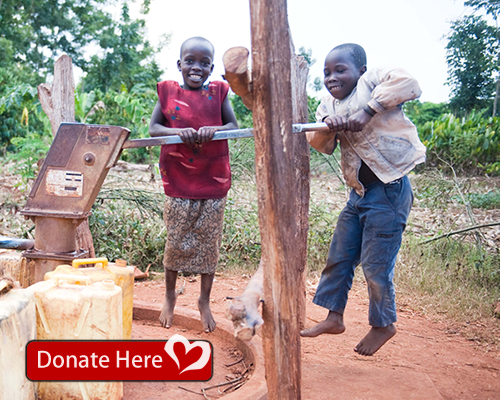Clean water is a Universal Human Right. Here’s how OneMama is helping facilitate that.
According to Water.org, 25% of the Ugandans do not have access to clean water, and 80% of the people do not have adequate sanitation. The major source of freshwater for the people of the Kayunga District, home to the OneMama.org health center and birthing clinic, is the Nile River as well as fresh water sources from rain. It is estimated that only 25% of the people living in Kayunga have access to clean water. As Siobhan Neilland, Founder of OneMama, explains, “There are a few private borehole wells on people’s private property but there are not community wells for broader community access to fresh water. There is a real need for more boreholes, rainwater catchment systems and a water filtration system to provide the community with access to clean water.”
With a population of about of about 27,000, providing the people of the Kayunga District with clean water is a critical health issue. According to the World Health Organization, at least 2 billion people use a source of drinking water contaminated with feces. Contaminated water can also transmit illnesses and diseases such as diarrhea, cholera, dysentery, typhoid, and polio. Contaminated water is estimated to cause 502,000 diarrhoeal death each year, and it is the number one source of most infections. Using and drinking unsafe water is one of the leading causes of death in Uganda. And it is estimated that 4500 Ugandan children die each year due to not having access to clean water and proper sanitation. Dehydration and malnutrition causes diarrhoeal illnesses- a leading cause of death in young children.
It is well established that access to clean water is one of the most important steps in preventing the spread of contagious diseases. It’s critical to effectively treating the sick, caring for mothers and newborns, as well as preventing the spread of disease among the general population. Siobhan Neilland explains, “Many of patients come to the clinic with waterborne diseases from either washing their food or their clothes in the Nile River.” OneMama is raising funds to provide the Kirindi Parish of about 8,000 to 10,000 people with a mix of water wells (boreholes) and purified water catchment systems. Siobhan Neilland explains, “We are pushing for this program and project to decrease the waterborne illnesses impacting the OneMama Health Center community.”
According to the World Bank, “Water security is among the top global risks in terms of impact.” It’s a full blown crisis. “It is a crisis of ‘too much’, ‘too polluted’, and ‘too little’. ‘Too much’ because of the devastating impacts of floods, exacerbated by climate change is hitting poor people first and worst. ‘Too polluted’ because so much wastewater does not get collected or treated. And ‘too little’ because across the world 2.1 billion people lack reliable access to safely managed sanitation services. All the while, water scarcity could cost some regions up to 6% of their GDP, spur migration, and, in the extreme spark conflict.” It’s is a major issue for much of the developing world, and the Kayunga District is among the areas in desperate need of reliable sanitation and access to clean water.
According to the World Health Organization, water “is also an integral part to the achievement of Sustainable Development Goals (SDG), which OneMama has committed to achieving. The world will not be able to meet the sustainable development challenges of the 21st Century without improving management of water resources and ensuring access to reliable water and sustainable services.” For the province of Kayunga, creating a reliable water management system that provides the local population with access to clean reliable water and sanitation is a major priority. OneMama is committed to making sure that the local population has access to clean water and proper sanitation a priority. The best way to stop the spread of diseases is prevention, and it starts with clean water.


